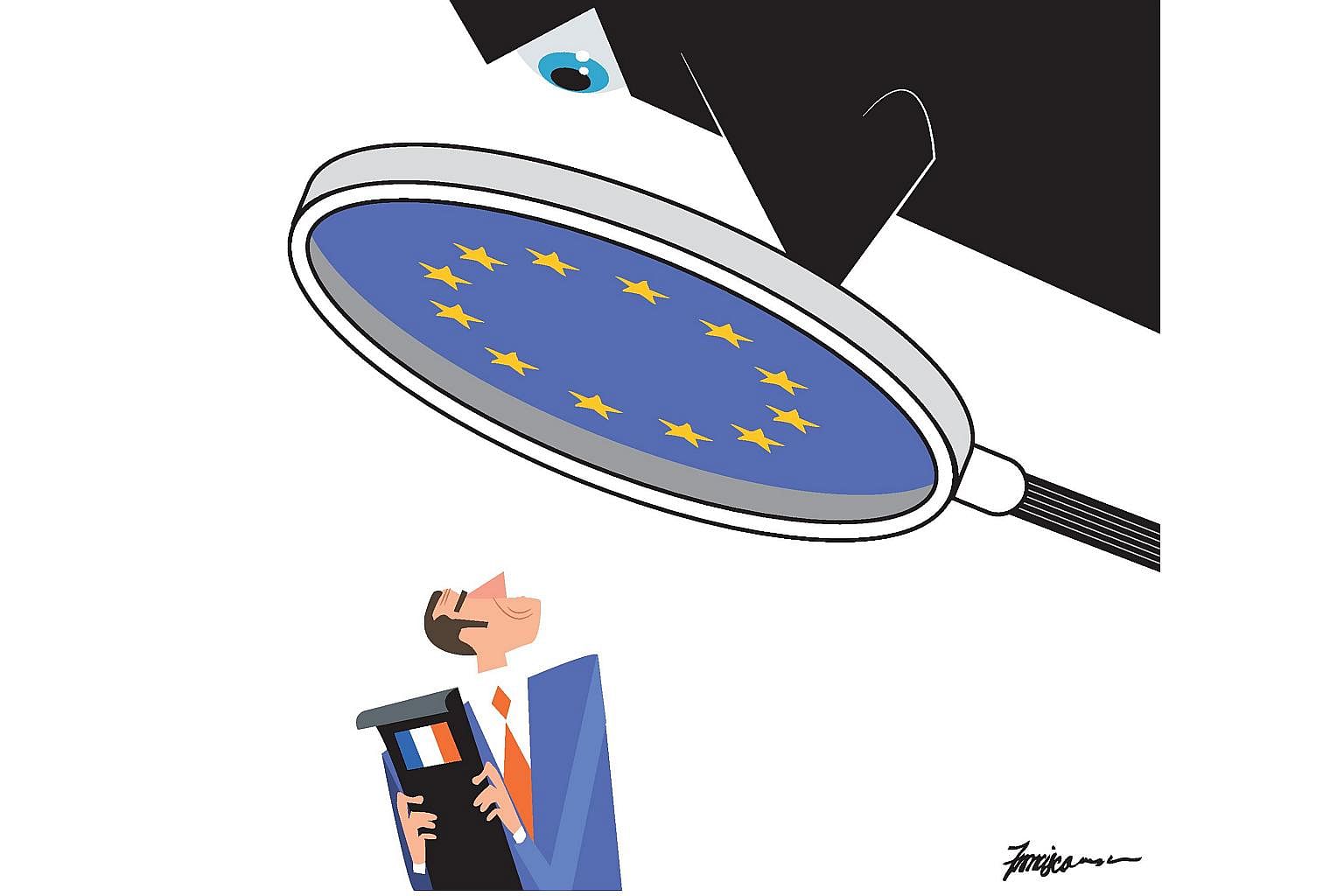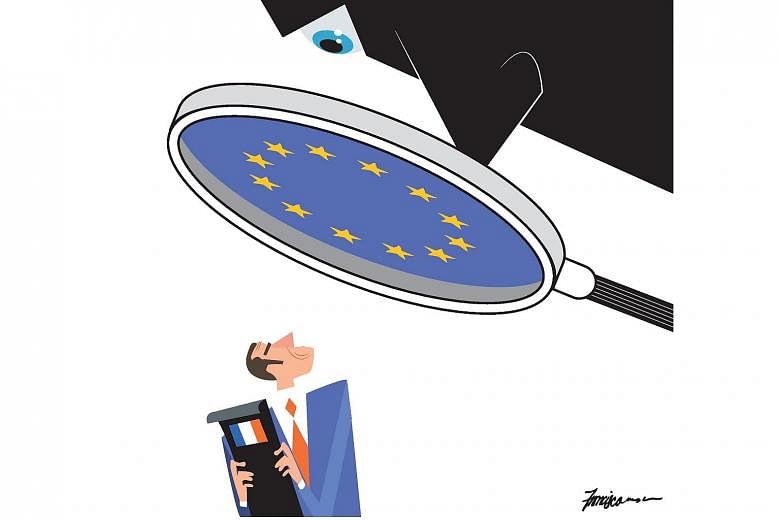LONDON • He is Europe's hottest political commodity; at last week's European Union summit, the first he has attended since his election, French President Emmanuel Macron was literally mobbed by his fellow leaders, all looking up to him as a source of inspiration.
And for good reason. Mr Macron not only saved his country by defeating a strong challenge from the far-right, anti-immigrant National Front, but also engineered one of Europe's most spectacular electoral storms, by creating a political party from scratch and securing both the presidential and parliamentary elections in France within a month.
That he did so while extolling the virtues of both the EU and globalisation, and refusing to make any concessions to those opposed to either of these concepts, only made his triumph that much more significant; he has shown that it is possible to swim against perceived political tides, and come out on top.
Yet, notwithstanding all the deserved praise that Mr Macron is getting, it is also worth noting that the challenges facing him remain formidable, and that his chances of success are no better than even. Just about the worst thing his European colleagues can do is to assume that, because he has been incredibly lucky until now, he will continue to walk on water.
There is no doubt that he has been shrewd in plotting his rise to power with a razor-sharp precision and dogged determination that few other European leaders possess. But there is equally no doubt that he was also incredibly lucky.
Had the left-wing camp in French politics not been divided between a lacklustre socialist presidential candidate and a far-left firebrand, he would have been eliminated in the first ballot of the French elections. Had the candidate of the mainstream centre-right Republicans not imploded during the electoral campaign because of a family financial scandal, we wouldn't be talking about Mr Macron today.
And had he confronted any person other than National Front leader Marine Le Pen in the second and decisive round of the presidential elections, it's quite possible that he would have been just a footnote by now in French political history.

As he is at the start of his political career, with just a brief government experience to his name and no political structure behind him, his chances of becoming France's head of state depended on a meltdown of all his opponents, a most unlikely scenario under normal circumstances. The fact that this is precisely what happened is the stuff of legends - akin to winning the jackpot in a lottery, on a single ticket.
But there is a sting in this story of success - although he is popular and his calls for deep economic reform have struck a chord with the public, few people in France truly understand what Mr Macron actually stands for. In essence, he was elected in the hope that a new political consensus for reform could be forged once he was in office, rather than because of a consensus over the need for change. And that could turn out to be Mr Macron's greatest weakness.
PRESSING NEED FOR REFORM
The need for reform is self-evident. When the euro currency was introduced 15 years ago, Germany and France, the euro zone's two biggest countries, enjoyed comparable living standards. Today, Germany's is a fifth higher than France's, and the German unemployment rate is less than half that prevailing in France.
To make matters worse, a quarter of those below the age of 25 are out of work in France, and the overwhelming majority of those who do get hired remain on temporary contracts. Nor are these passing phenomena - since the mid-1990s, French economic growth has been lagging behind and, since the end of the latest global financial crisis, France's recovery has been anaemic in comparison with that of Britain, Germany or the United States. In short, this is a long story of underperformance.
For more than three decades, every French president has come to office promising reform, and every single one has failed, often because of inbuilt opposition to change, or a lack of consensus over what needs to be done.
In this respect, Mr Macron proves the rule rather than being the exception; he frequently mentioned reform during the latest electoral campaign, but often avoided getting into specifics and most certainly did not try to create a consensus.
Instead, he opted to smash France's established political system by destroying both the established left- and right-wing political parties, while ensuring that his hastily created political movement now holds a massive majority in Parliament. In theory, that gives him the mandate for any change he wants; in practice, it does nothing of the sort.
The Socialist Party, which governed France until earlier this month but has now been reduced to less than 10 per cent of the seats in Parliament in Paris, will use all its influence with the trade unions to block reforms. And Mr Macron's own party, a collection of yes-men, will prove to be an unruly lot, hardly the vehicle for delivering reform; the President has already lost two senior ministers in his Cabinet.
PENSIONS AND EURO REFORM
Mr Macron has already acknowledged that reform will come by fiat from above, rather than agreement from below; he plans to impose reform by decree, and hopes to have all these in place by the time summer holidays arrive in France, on the assumption that this would reduce the scope for strikes.
The tactic might work. But bare statistics are already making Mr Macron's task difficult. One of his key promises has been to reform the country's state pension system without increasing the retirement age. Yet, in the past week, France's own official pensions auditor has announced that the pension system is diving into the red at a much faster rate than anticipated, so most of what Mr Macron promised on this front is already irrelevant.
And another major gamble that he is now embarking on could also fail. From his first day in office, the French President has aimed most of his foreign policy initiatives towards Germany; many of his Cabinet ministers, including the Prime Minister, are German speakers.
Mr Macron's objective is transparent: He hopes to rekindle the close Franco-German link that used to run Europe and has a good chance of doing it again now that Britain is leaving the EU. But he also hopes to persuade the Germans to accept a new way of managing the euro currency - one in which countries share the burden of debts with one another, rather than sticking to the current arrangement under which countries that have heavy debts are liable for them alone, and are expected to service debt usually by introducing austerity measures that make repayment even harder.
Previous French presidents have made similar appeals to the Germans, only to be rebuffed by Chancellor Angela Merkel. Mr Macron's offer, however, is more cleverly put together: He is promising that, in return for a German concession on the management of the euro currency, France will put its own economic house in order and will accept closer EU political integration.
Yet again, that might work. But the risks are also formidable. The Germans desperately want to help Mr Macron, but might end up offering too few concessions on the euro to help France. Many of the euro changes that Mr Macron wants would also require amendments to existing EU treaties, and that in turn would bring to the fore the need for the dreaded referendums that in Europe have a knack of producing unexpected victories for the "no" camp.
And then, there are the big misgivings in Europe about what the French are proposing. Mr Macron's suggestions that the EU should restrict foreign investment in "strategic" European enterprises are already raising eyebrows among advocates of open markets. And Mr Macron's patronising attitudes towards East European members of the EU are not winning France many continental friends.
There is no question that Europe desperately needs Mr Macron to succeed; his fate is inextricably linked to that of the continent. There are also few people better equipped than Mr Macron to succeed: He has the determination, nous and luck, even when he gambles.
Still, it's worth recalling that even the most successful gamblers do eventually run out of luck. And always earlier than they would care to think.


